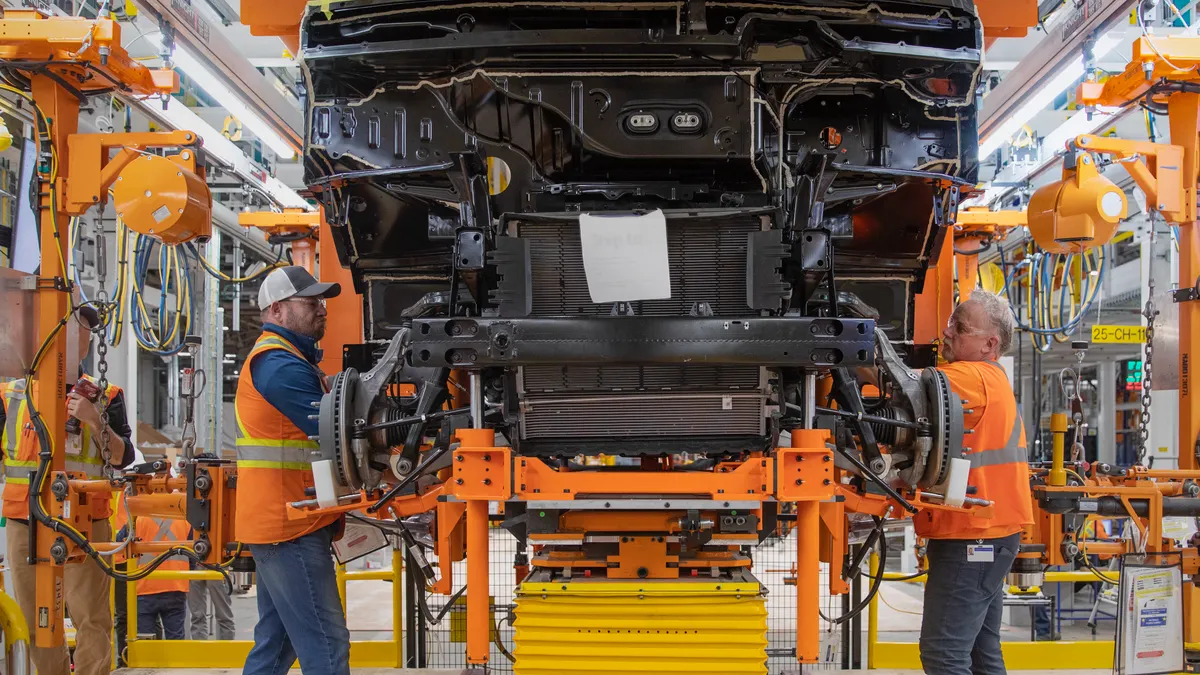Editor's note: This story is part of the WardsAuto digital archive, which may include content that was first published in print, or in different web layouts.
An earthquake. A tsunami. A pandemic. And now a global shortage of microprocessors without which cars can’t run. Have we ever seen the automotive supply chain tested so severely as we have over the past decade?
Cars are assembled with thousands of parts, but even if just one part is missing the assembly lines grind to a halt.
Automakers and suppliers are masters of logistics, but sometimes there are natural calamities that throw their carefully laid plans out the window. The computer chip shortage shows it’s time to take a new approach.
There are several reasons for the chip shortage, but it starts with the COVID-19 pandemic. In the early spring of 2020 auto plants began to shut down as countries went into lockdowns and millions of customers stopped shopping for cars.
No one knew when production would resume, so automakers started canceling orders with their suppliers, including their chip suppliers. That was a mistake.
There is tremendous global demand for microprocessors, and when automakers canceled their orders, others sprang in to snatch them up.
Sales of consumer electronics boomed as locked-down citizens ordered gaming consoles, smart TVs and a host of other products to keep themselves entertained at home.
Demand for chips is so strong that if you cancel your order, you automatically lose your place in line. And that’s where the auto industry now finds itself – at the back of the line.
As far as chip makers are concerned, the auto industry is a low priority. Even though automakers make roughly 100 million vehicles a year and they’re packed with microprocessors, the auto industry only accounts for about 10% of global chip demand.
Cellphones alone account for nearly half of all the micros that are made in the world. Automakers are used to being the 600-pound gorilla in the room and bending suppliers to their will, but that’s not the case when it comes to chips.
Moreover, the lead times on chips is six months. Manufacturing a microprocessor involves up to 800 steps.
What’s needed is more manufacturing capacity, and that is being addressed. But a major microprocessor fab plant can cost $10 billion. That’s about the same cost as five new automotive assembly plants. The car companies can’t afford that, and not many others have the deep pockets to suddenly invest in more fab plants.
The European Union is talking about committing $30 billion to build its own chip foundries. In the U.S., business groups including automakers are asking the Biden Admin. to provide incentives for new chip plants. Congress enacted legislation to do that last year but never coughed up the money. Now it’s time to act.
This is a serious issue. GM CEO Mary Barra already has warned investors the chip shortage could shave $2 billion off the company’s bottom line this year.
No doubt everyone else will take a haircut, too. And the shortage goes well beyond the auto industry. It’s impacting the aerospace, defense and medical industries. So, it has national security implications.
Incentives are good, but they’re not good enough. Today it’s a shortage of chips, but what will the shortage be tomorrow? Lithium for EV batteries? Rare earth materials for EV motors?
What the U.S. and EU need is a strategy that identifies critical materials and components and puts the plans together to make sure they’re not caught short again.
In the meantime, there are several steps automakers can take. Right now, they’re whittling down the number of platforms they use and maximizing how many components they can share across different model lines.
To get better prices, they’re offering fewer suppliers more of the business. Maybe it would be smarter to pay a bit more and spread those contracts out among more suppliers.
Also, the big lesson here is: Don’t cancel your contracts with chip suppliers, or you’ll just go to the back of the line. Instead, keep your orders but push them back a bit. It’s a lot easier to step back into line a couple of months down the road if you’ve already got your orders in place.
The chip shortage probably will be resolved later this year. And with heavy overtime automakers will be able to make up most of their lost production.
But there’s a danger in that. Once the problem blows over, the natural tendency is to lapse back to the old ways of doing things.
Hopefully that won’t happen. The automotive supply chain has taken too many hits over the past decade. And the industry has to be prepared for the next calamity that’s almost certainly lurking in the shadows.
John McElroy (pictured above, left) is editorial director of Blue Sky Productions and producer of “Autoline Detroit” for WTVS-Channel 56, Detroit.




















